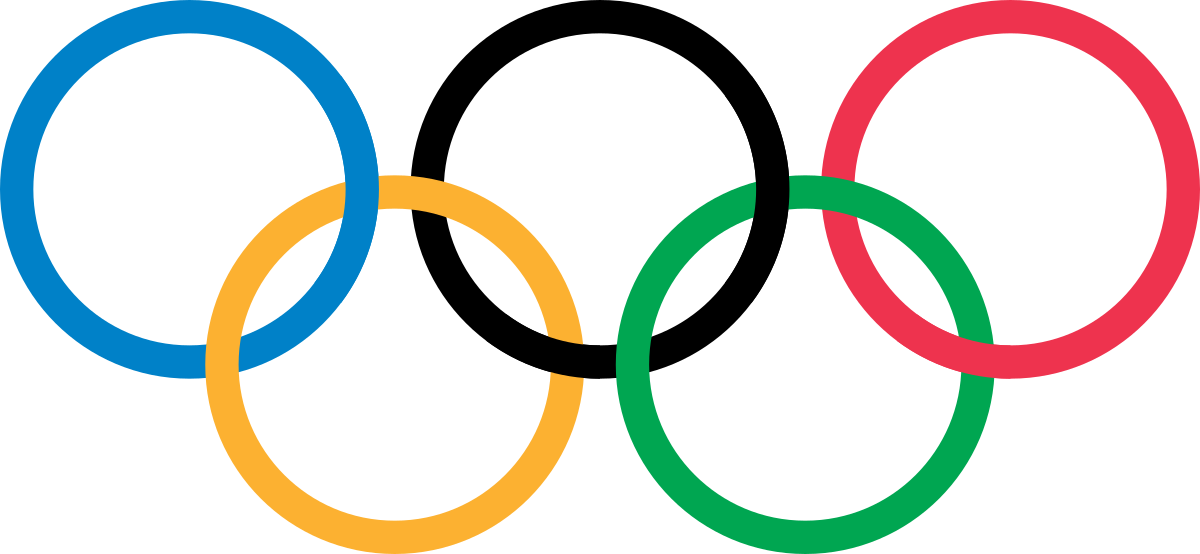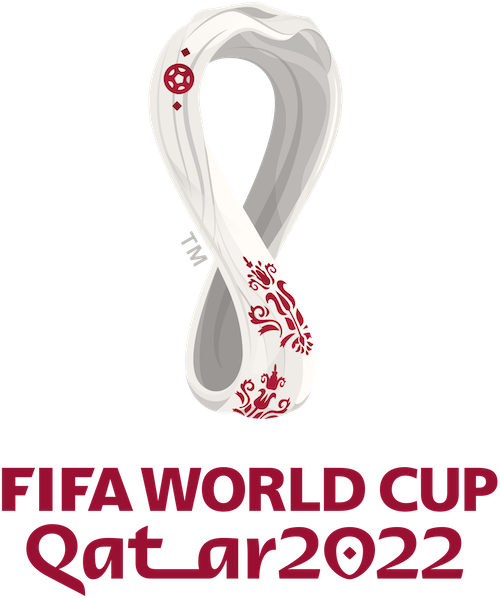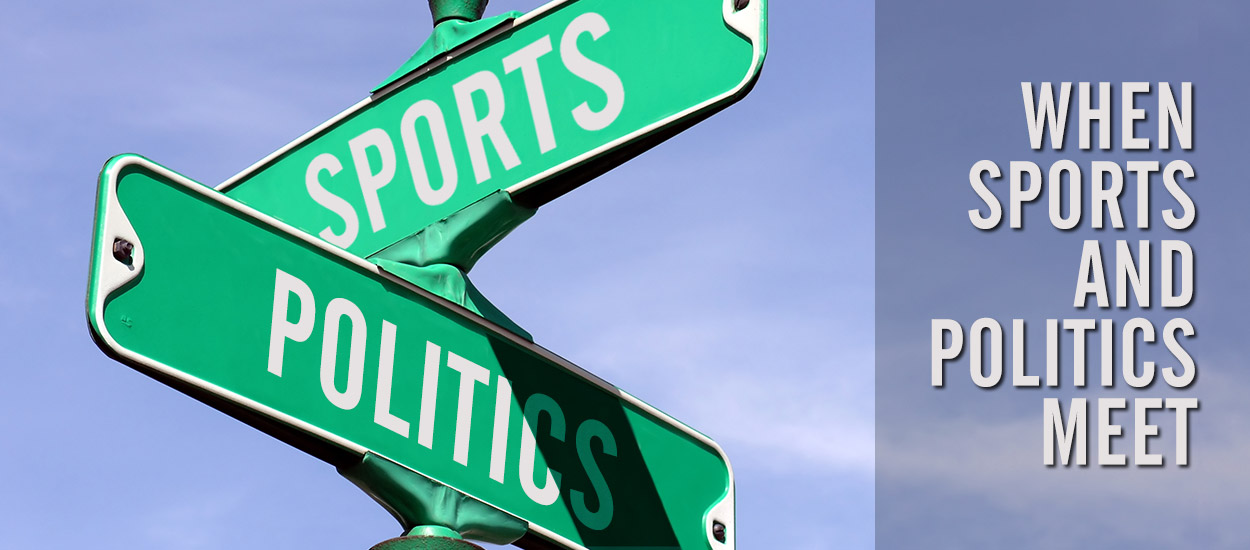Protests at the World Cup are nothing new for sports
During the Portugal vs. Uruguay World Cup game on Monday a fan ran out on the field with a rainbow flag. One of the commentators on the feed I was watching said that the disruption was unfortunate as sport should never be political. The comment took me aback as I wondered to myself "when is sport not political?" Whether it's an international competition like the World Cup or Olympics or whether it’s a local football game, politics have always played a role.
The first Ancient Olympic games took place in Greece in around 800 BC, when several city-states decided to create a competition in honor of Zeus. The prizes to the winners were olive wreaths and crowns. The purpose of the games was to create a friendly competition to prove which state is better than the other, and sports seemed like the best avenue to make that determination. In an effort to try and make the games more even, all athletes competed naked, although I assume that caused more issues than it solved since wrestling and boxing were events at those Olympics. But even then, it could not be argued that the Olympics at least in part were more political than fun.  Even during times of war, leaders would attend the games to support their athletes, and Greece actually delayed putting an army together to defend an attack by the Persians until after the Olympics were completed. Moreover, during the Peloponnesian War (around 405 BC to 431 BC) between Sparta and Athens, a temporary truce was taken to allow the athletes to participate in the Olympics. According to sources the glory from defeating the other side in sporting events every four years was deemed more meaningful politically than the war itself, especially since the Olympics also affirmed the state's choice of religion.
Even during times of war, leaders would attend the games to support their athletes, and Greece actually delayed putting an army together to defend an attack by the Persians until after the Olympics were completed. Moreover, during the Peloponnesian War (around 405 BC to 431 BC) between Sparta and Athens, a temporary truce was taken to allow the athletes to participate in the Olympics. According to sources the glory from defeating the other side in sporting events every four years was deemed more meaningful politically than the war itself, especially since the Olympics also affirmed the state's choice of religion.
As for the modern Olympics, which began in 1896, the purpose was to create friendly competition among countries, although the real purpose was to prove the superiority of one government over another. This was evidenced numerous times, with the most obvious example being the 1936 Olympic games, when Adolf Hitler hoped the Berlin games would show "Aryan superiority" to justify Nazi policies. When Jesse Owens won four gold medals for the United States, Hitler refused to shake hands with the black runner, who was deemed inferior to the white race. But this wasn't the only political controversy to occur among nations at the Olympics. The following are all political events that occurred in the Summer Olympics since 1896 and the list is far from comprehensive.
- In 1908, Finland was forced to compete without displaying the Finnish flag for fear by the IOC of upsetting the Russian Empire
- In 1920 all the axis powers in WWI including Germany, Austria, Hungary, Bulgaria and Turkey were excluded from the games which was moved from Budapest to Belgium
- In 1952 the Russian Empire boycotted the games due to the inclusion of Germany and Japan in the Olympics which they felt was too close to the ending of WWII
- In 1956 games, seven countries boycotted the games held in Sweden and Australia for various country specific reasons including Egypt nationalizing the Suez Canal, The Soviet Union invading Hungary, and Taiwan being recognized independently of China which led to a Chinese boycott
- In 1964, South Africa was excluded from the games due to its apartheid policies
- In 1972, the Munich Massacre saw Palestinian terrorists kill 11 Israeli athletes and coaches, and 1 West German cop. Plus, this was the first instance where black athletes raised their fists to demonstrate a black power salute
- In 1976 in Montreal several African nations withdrew due to the inclusion of South Africa and China withdrew its athletes over the protest of allowing Taiwan to compete independently
- In 1980 over 65 nations including the United States and Canada withdrew to protest the invasion of Afghanistan by the Soviet Union
- In 1984 most communist countries retaliated for the 1980 withdrawals by not participating in the Los Angeles games
- In 1988 North Korea refused to participate in games held in South Korea
In addition to all the boycotts, the games were wrought with cheating scandals, as various nations, including the Soviet Union, East Germany and China, among others, had programs to bulk up athletes with steroids and took measures to hide it in an effort to give their countries an advantage over the others. Plus, in sports that were settled by judge’s decisions in both the summer games and winter games, such as gymnastics, diving, ice dancing and figure skating, there were accusations of collusion between countries to rig the scores of athletes to get a desired result, rather than the correct scores. While steroid scandals also included Western nations, those were generally perpetuated by the athletes themselves without country involvement.
Other international competitions, like the World Cup, are also very political, with host cities often chosen strictly based on money and bribes, which was the case with Qatar this year. There have also been similar accusations against Formula 1, which has given races to several oil-rich countries, including Abu Dhabi, Azerbaijan, Bahrain and last year, Qatar and Saudi Arabia, rather than expanding races in traditional European countries. And in non-Covid years, F1 has been reprimanded for giving races to China and Russia.
And in golf, Greg Norman teamed up with the Saudi Arabian government to create LIV Golf to compete with the PGA Tour and European Tour, using excessive amounts of money to lure some of the best golfers away from their tours, such as Dustin Johnson, Cameron Smith, Bryson Dechambeau and Brooks Koepka, as well as some well recognized names whose best days may be behind them, such as Phil Mickelson, Lee Westwood and Sergio Garcia. All the golfers that joined LIV have contended that they made the move in an effort to play less for more money, although some golfers such as Patrick Reed have been playing more golf and have acknowledged that it’s all about the money and using LIV to change the policies of the other tours.
In all the above cases, including this year’s World Cup, the organizers have been accused of teaming up with repressive, dangerous and violent regimes to help them "sportswash" their human rights records. It’s not a coincidence that Saudi Arabia launched LIV Golf only a year after the regime was internationally condemned for murdering reporter Jamal Khashoggi for speaking out against Saudi policies, and Qatar has long been scrutinized for repressing the rights of women, LGBTQ and even non-Muslims.  The country has also been accused of abusing foreign workers. Amnesty International says that foreign workers, mostly from South Asia “have been subjected to labor abuses, abysmally low pay, and other exploitation,” and there are reports say that 6,500 migrant workers have died since the World Cup was awarded a decade ago, including 37 who died in work directly related to the construction of World Cup facilities. It is also notable that Qatar expects their moral values to apply to visitors, including not showing any form of gay love, not drinking alcohol (Anheuser-Busch is even suing FIFA for $75 million after being disallowed to sell beer at the stadia despite having a contract) and forbidding gambling. In fact, anyone who gambles on games from Qatar can be subjected to jail time, despite the fact the World Cup is the biggest gambling event in the world. And of course, the International Olympic Committee has been accused of similar objectives after awarding the winter games to Beijing in 2022 despite China’s human rights violations and to Russia in 2014 despite anti-gay laws being passed in that country, along with other human rights violations that are well documented.
The country has also been accused of abusing foreign workers. Amnesty International says that foreign workers, mostly from South Asia “have been subjected to labor abuses, abysmally low pay, and other exploitation,” and there are reports say that 6,500 migrant workers have died since the World Cup was awarded a decade ago, including 37 who died in work directly related to the construction of World Cup facilities. It is also notable that Qatar expects their moral values to apply to visitors, including not showing any form of gay love, not drinking alcohol (Anheuser-Busch is even suing FIFA for $75 million after being disallowed to sell beer at the stadia despite having a contract) and forbidding gambling. In fact, anyone who gambles on games from Qatar can be subjected to jail time, despite the fact the World Cup is the biggest gambling event in the world. And of course, the International Olympic Committee has been accused of similar objectives after awarding the winter games to Beijing in 2022 despite China’s human rights violations and to Russia in 2014 despite anti-gay laws being passed in that country, along with other human rights violations that are well documented.
So, to hear a commentator suggest that political protests at the World Cup and sporting events in general is not appropriate is quite laughable. All international competitions are going to be political, and in some cases even local events are political. Colin Kaepernick effectively lost his career after he decided to kneel for the National Anthem to protest police brutality against black people, a decision that led President Donald Trump to suggest that teams should fire anyone who protests the anthem, to which the San Francisco 49ers adhered and let Kaepernick go. And Muhammad Ali almost went to jail over a political protest against the Vietnam draft. Perhaps sports should be less about politics, but that is a different argument, and it can’t be argued that protests do often make a difference. Will the person running on the field will invoke change regarding the LGBTQ community in repressive countries? It’s unlikely, but most will agree that seeing the Iran players refusing to sing their National Anthem in protest of the murder of Mahsa Amini by the morality police for failing to wear a tight head covering in an airport was actually quite meaningful and will continue to remind everyone that all nations and athletes are duty bound to speak out when they see wrong in the world.
Read insights from Hartley Henderson every week here at OSGA and check out Hartley's RUMOR MILL!







































